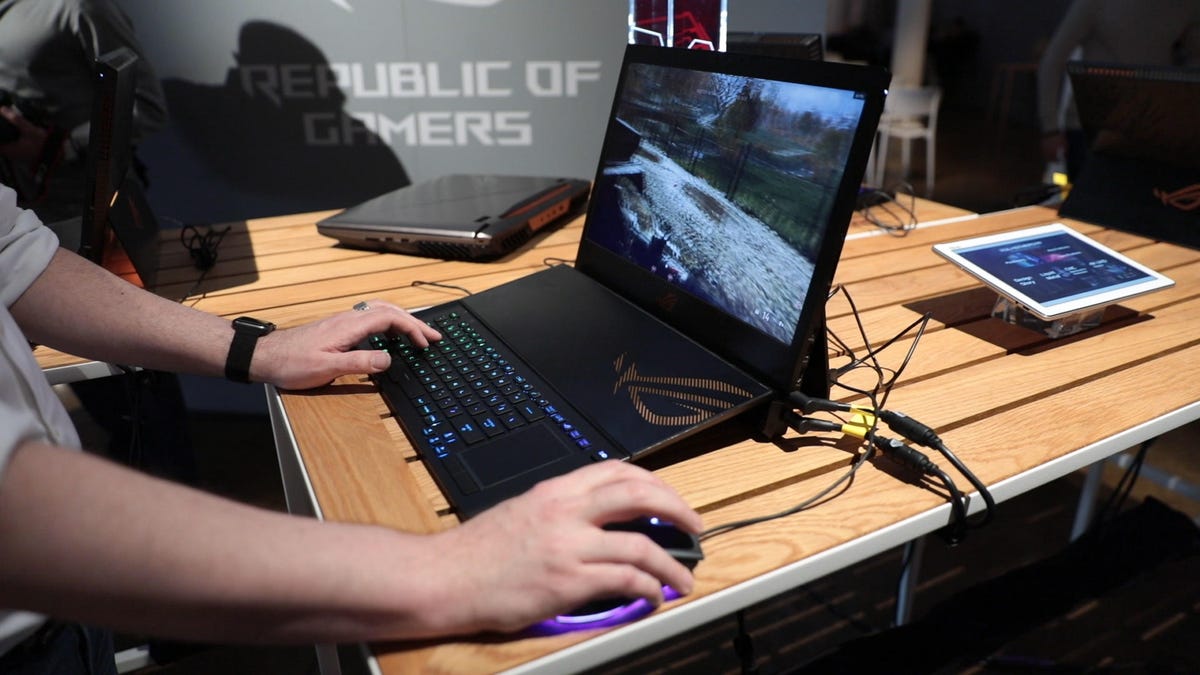Intel Core i9-9980HK leads second-wave ninth-generation CPU blitz
Now's a good time to start looking for eighth-generation bargains.

The convertible Asus ROG Mothership GZ700GX and its clamshell alter ego, the ROG G703, are among the first to pack the Core i9-9980HK processor.
Intel launched its ninth-generation (aka Coffee Lake refresh) desktop CPUs in October 2018 with its most powerful offerings, and true to form now hits us with its mobile analogs, the H series Core i9, i7 and i5 processors , as well as the stragglers -- all 18 of them -- of the desktop versions.
The eighth-generation Coffee Lake rollout was more notable, bringing with it six- and eight-core processors after years of plodding along with two or four cores. The new top-of-the-line mobile processor, the Core i9-9980HK, is probably the most welcome. Maybe we'll soon see the monster portables like the Alienware Area-51m , which use the power-guzzling-for-a-laptop i9-9900K desktop processor, switch over so that they don't need two power connections. Although the Asus ROG Mothership GZ700GX and its clamshell sibling the ROG G703 both use the i9-9980K and still need to double up on the power, so maybe not.
New ninth-gen mobile processors
| Base clock | Boost clock | Cores/threads | Cache | |
|---|---|---|---|---|
| i9-9980HK | 2.4 | 5.0 | 8/16 | 16MB |
| i9-9980H | 2.3 | 4.8 | 8/16 | 16MB |
| i7-9850H | 2.6 | 4.6 | 6/12 | 12MB |
| i7-9750H | 2.6 | 4.5 | 6/12 | 12MB |
| i5-9400H | 2.5 | 4.3 | 4/8 | 8MB |
| i5-9300H | 2.4 | 4.1 | 4/8 | 8MB |
For ninth-generation, many of these are minor bumps over their predecessors, albeit not all in the same way. For instance, the mobile i7-9750H has a slightly faster boost clock of 4.5GHz to the i7-8750H's 4.3GHz, plus an extra 3MB of cache, while the i5-9400H just gets a tiny bump of 0.1MHz in the boost clock.
However, the supporting chipset for the ninth-gen mobile processors brings support for Wi-Fi 6 AX200, Intel Optane H10 (which can integrate the storage cache with the SSD), and 128GB RAM.
Keep in mind that these are the higher-end processors designed for larger laptops , not the Y and U series processors which power slim or light laptops like ultraportables. Those usually show up near the end of August, in time for you to put sleek, tiny notebooks on your holiday shopping list.
Nevertheless, these new processors will be everywhere by the end of May, if not earlier. Intel and Nvidia simultaneously announced their newest mobile parts, guaranteeing a deluge of gaming system updates. Asus, Razer and Lenovo were only a fraction of the gaming notebook makers who told us of their plans in advance.
Despite the small advance ninth-generation conveys as well as its certain ubiquity, you'll probably be able to pick up an older eighth-gen laptop on sale from any major manufacturer in the coming months. However they won't have the latest generation of Nvidia graphics -- no one's going to put a new GPU with an old CPU, though that's a marketing, not technology, issue -- and that's something you might miss.
As with the mobile processors, what's most interesting about the desktop CPUs is the arrival of the eight-core/16-thread i9-9900 variants in lower-power, locked versions -- in other words, designed for compact desktops and all-in-ones (i9-9900T) or content-creation desktops which don't require the thermal flexibility to support an overclocked i9-9900K (the i9-9900), and can therefore be smaller but not sacrifice that 5GHz maximum boost.

